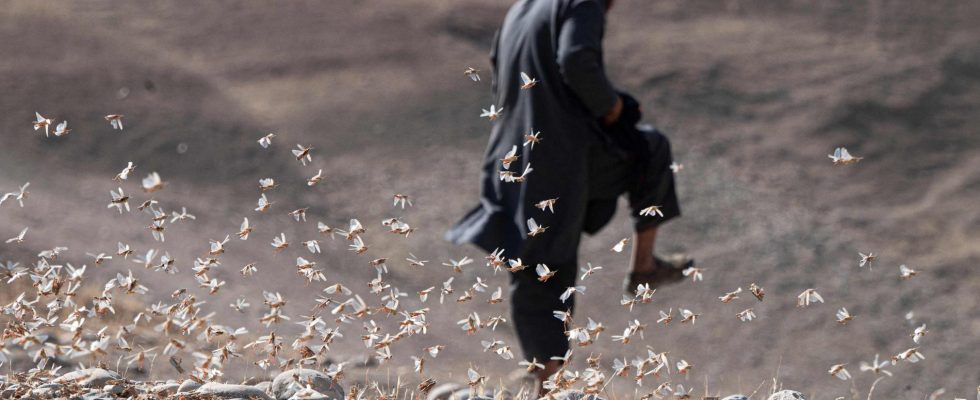Swarms of locusts are spreading over crops in northern Afghanistan, of farmers whose families are already affected by famine.
– We go with hungry stomachs to kill the grasshoppers. If we don’t kill them, our agriculture will be destroyed, says Baz Mohammad in the village of Kandali.
Hundreds of thousands of locusts have taken over wheat fields in Kandali in the northern Balkh province of Afghanistan.
– They eat everything that is green: wheat, peas, sesame, notes Baz Mohammad, who is involved in the local government.
After eating the crop, the insects lay eggs that will hatch the following spring. This means that the destruction continues in the country where, according to the UN, the vast majority of families are already struggling to afford food.
It is the third year in a row that Afghanistan has been affected by drought. This year, farmers have reported no rain at all since March. Rainfall could otherwise have helped by washing away insects.
Economic crisis
This year, conditions are also “perfect” for grasshoppers, according to the UN’s Food and Agriculture Organization FAO.
– Afghanistan used to have a very strong control system for locusts. But it has been severely eroded in the last two years, says FAO’s Afghanistan representative Richard Trenchard.
The country’s economy is in dire straits after decades of war. The crisis has deepened since international aid was withdrawn after the Taliban seized power in the country in August 2021. About 85 percent of the population lives in poverty, according to the United Nations Development Program UNDP.
Inadequate measures
Around 7,000 hectares of land have been treated with chemicals or manually, but it is not enough, says Sifatullah Azizi, who leads the locust control in Balkh province.
– We have acted within the framework of our possibilities. To eradicate them, a budget is needed to hire workers, pay for fuel and products, he says.
38-year-old farmer Abdul Raqib Kazimi says 60 to 70 percent of his land has been destroyed, including fodder for livestock.
– We have to have food ourselves. If there is no wheat, there is no flour, he says.
– I am very worried because these grasshoppers lay eggs in this area. Next year it will once again be out of my and my neighbors’ control.
FACTAfghanistan
Afghanistan is an Islamic republic with a gender-segregated society. The arch-conservative Taliban, who rule the country, call it an Islamic emirate. War has raged essentially constantly since the late 1970s, and the economy and infrastructure are in ruins.
The invasion of the Soviet Union in 1979 was followed by a protracted war between the communist regime and Islamist mujahedin groups, supported by the United States. After the seizure of power in 1992, the militia groups soon turned their weapons on each other. The chaos and war fatigue paved the way for the fundamentalist Taliban movement, which within a few years took control of the country.
After the terrorist attacks in the United States on September 11, 2001, US-led forces entered Afghanistan and overthrew the Taliban regime. Attempts to rebuild the country have since been marred by acts of violence and setbacks.
After taking office as President of the United States, Joe Biden promised that all American soldiers would have left Afghanistan by September 11, 2021, the 20th anniversary of the terrorist attack. In August 2021, the United States left the country and the Islamist fundamentalist Taliban movement took power through a lightning offensive.
Sources: National Encyclopedia, Landguiden/UI.
Read more
